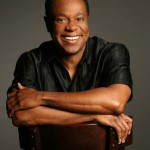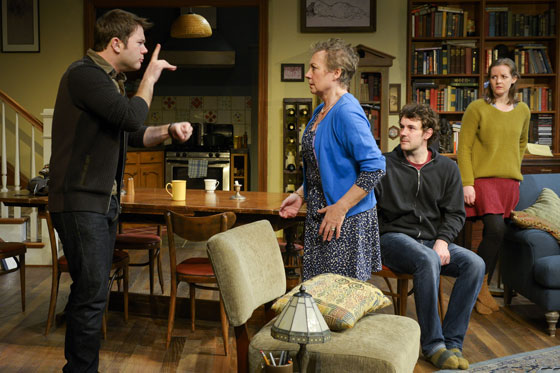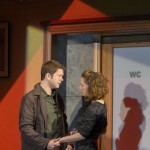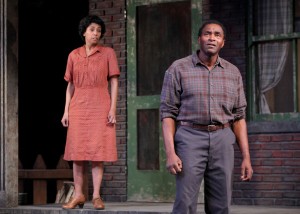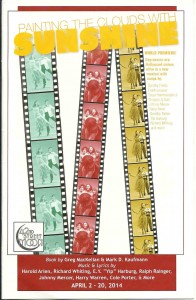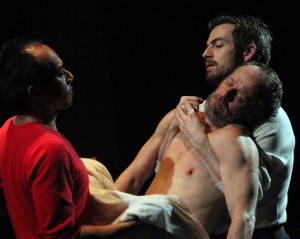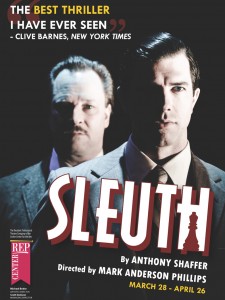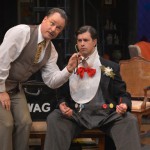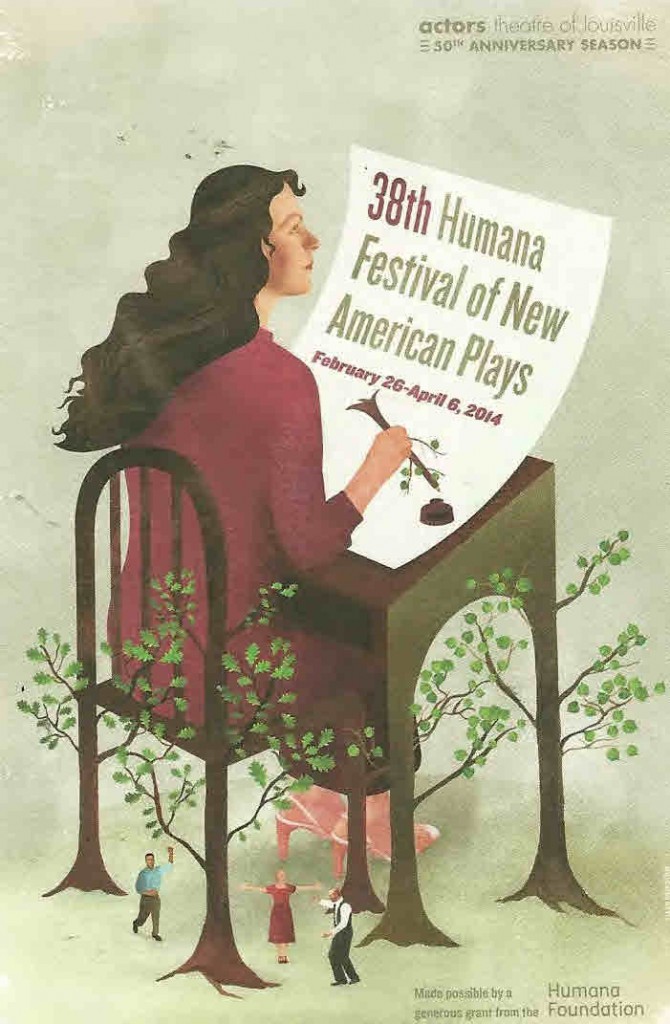
38TH HUMANA NEW AMERICAN PLAY FESTIVAL: February 26 –April 6, 2014
Actors Theatre of Louisville, 316 West Main Street, Louisville, KY 40202. 502-584-1205, or www.actorstheatre.org.
Reams of accolades could be written about the plethora of fine acting, directing and production values at the Humana New American Play Festival but for these capsule reviews the emphasis is on “the plays the thing.” In reference to the running times please note that none of the plays have an intermission.
It is very appropriate that the sentence above should be used as the header for all the Humana New American Play Festivals. The venue at Actors Theatre of Louisville is composed of three superb performing areas outfitted with all the conceivable technical paraphernalia one can imagine. There is the commodious proscenium arch Pamela Brown Auditorium, the theatre-in-the-round Bingham and the intimate “black-box” Victor Jory thrust stage. One might wonder about the process used select the space for each play. With one notable exception the venue selection was appropriate.
That one exception is the staging of brownsville song (b-side for tray) (no capitals used in the title) by Kimber Lee and directed by Meredith McDonough of TheatreWorks fame for overseeing their New Works Festivals in Palo Alto. She is now the associate artistic director to Les Waters formerly of Berkeley Rep who is in his second season as artistic director at Actors Theatre.
brownsville song is a small personal confidential play wrapped in socially injustice. Brownsville in Brooklyn is predominately a Black neighborhood with a myriad of social ills and perilous dangers. Living in this milieu is Kimber Lee’s protagonist Tray an intelligent, athletic high schooler, his grandmother Lena and young sister Devine whom he looks after as a surrogate father.
The play is non-linear moving back in forth in time but in doing so does not clearly delineate the relationships and needs a re-write. It begins with Lena’s dynamic monolog trying to give meaning to Tray’s death in a drive-by shooting.
Tray is offered help in preparing an application for a college scholarship by a woman, Merrell, who has been in an alcoholic rehabilitation center. As mentioned in the previous paragraph it is difficult to ascertain that Merrell is Devine’s mother and Tray’s step-mother.
The pathos of the play loses impact being performed on the entire massive stage area. Huge panels move back and forth and up and down with every change of scene. Never-the-less, when the author clarifies the relationships of the characters this play will “have legs” moving on to other venues.
brownsville song (b-side for tray): Drama by Kimber Lee and directed by Meredith McDonough. THE CAST: Lena, Cherene Snow; Devine, Sally Diallo; Tray, John Clarence Stewart; Merrell, Jackie Chung; & Junior/Brooklyn College Student, Joshua Boone.
Performing the SITI Company’s Steel Hammer in the Victor Jory Theatre was a stroke of genius befitting the style of Anne Bogart who combines dance, drama and music into her signature performance pieces. She has commissioned playwrights Kia Corthron, Will Power, Carl Hancock Rux and Regina Taylor to dramatize the story of John Henry who in the 1800s died working on the railroad and was made famous in song.
Interwoven with the dance and drama are music and lyrics of Julie Wolfe performed and recorded by Bang on a Can All-Stars and Trio Medieval. The six member cast headed by Eric Berryman playing John Henry give riveting performances with Berryman portraying the four versions John Henry to perfection. In the stage directions he must run a mile in the two hours upon the stage tiring himself as well as the audience. After one hour the accolade of “riveting” is replaced by “tedious. Judicious editing is needed before it would be ready for a road tour. Running time 2 hours.
Steel Hammer: Performance Piece directed by Anne Bogart with music and lyrics by Julia Wolfe and original text by Kia Corthron, Will Power, Carl Hancock Rux and Regina Taylor with recorded music performed by Bang on a Can All-Stars and Trio Mediaeval performed and created by SITI Company.
STEEL HAMMER WRITTEN AND PERFORMED BY SITI ;THE CAST (in alphabetical order): Akiko Aizawa; Eric Berryman; Patrice Johnson ChevannesGian-Murray Gianino; Barney O’Hanlon; Stephen Duff Webber.
Lucas Hnath’s play The Christians would be appropriate selection for the SF Playhouse as a follow-up on their January staging of Storefront Church by John Patrick Shanley. (SF Playhouse Artistic Director Bill English was in attendance). This capsule review has a personal flair since my youngest brother is a Pentecostal minister! Be assured that Fundamentalists look with askance at messing with the Bible. Author Hnath writes with authority since he was reared in such a milieu and in his youth gave sermons to the congregation.
Hnath is very even-handed in dealing with his subject matter and leaves the ultimate decision to believe or not to believe up to the audience. The Pastor of a financial secure mega-congregation Fundamentalist church has had a revelation that the accepted Biblical concept of Hell being a place of fire and brimstone where the un-baptized (non-believers) are condemned to eternal damnation is not true.
The first to challenge the Pastor is a black associate pastor Joshua who had been ‘saved’ from a life of non-belief and through rigorous diligent prayer has been elevated to his present position gaining the trust and reverence of the congregation. He is asked to leave Pastor’s church and in doing so takes a significant portion of the congregation with him.
By adding only three other characters to the mix, Hnath clearly defines the financial workings and ingrained beliefs of the church. There is the Elder who outlines the devastation to the financial basis, a young Congregant who sincerely question’s the Pastor’s motivation and the Pastor’s Wife who has faithfully believed in the goodness of her husband but now has severe reservations.
Director Lee Waters simply and elegantly stages the play with four ecclesiastical chairs down stage center and a church choir behind to add verisimilitude to the surroundings. The main characters all use hand held microphones even when talking to one another giving an aura of didactism yet the superb actors give depth to their lines and their questions will become your questions. All this takes place in 80 minutes and is ready to go on the road.
The Christians: Drama by Lucas Hnath an directed by Les WatersTHE CAST: Pastor, Andrew Garman; Associate Pastor, Larry Powell; Elder, Richard Hensel; Congregant, Emily Donahoe; Wife, Linda Powell.
Partners by Dorothy Fortenberry is a modern day pot-boiler in the mode of a TV soap-opera. It takes place in early 2012 one year after same-sex marriage (Marriage Equality Act) act was passed in New York State. The author may wish to revise the play after reading “Same-Sex Marriage — A Prescription for Better Health” by G. Gonzales in N Engl J Med 2014;370:1373-1376.
The play is really two stories that could individually be interesting but as written intertwining the frailties of a straight marriage and advantages/disadvantages of gay marriage leaves each subject superficially explored and at times banal.
Clare, an aspiring chef and husband Paul a well paid law firm technological worker had written there own marriage vows without the traditional “love, honor and obey” clause. Gay, underemployed (no health insurance) Ezra is Clare’s potential business partner planning to enter the booming food truck business. Brady, his boyfriend, is an under paid teacher/bread-winner thus making daily living problematic.
Clare gets a bundle of money from a medical class action lawsuit. Think of the axiom about money not solving problems. Clare and Paul have a falling out. She also does not tell Ezra that she has the money to finally get the food truck up and running. Inexplicably she donates most of the money to groups supporting legalization of same-sex marriage. Don’t ask why. There are spurts of cogent dialog with most of the humor being garnered by Ezra’s gay demeanor. Conclusion: Partners is not ready for prime time. Running time 105 minutes.
Partners: Comedy/Drama by Dorothy Fortenberry and directed by Lila Neugebauer
THE CAST: Clare, an aspiring chef, Annie Purcell; Paul, her husband, David Ross; Ezra, Clare’s best friend and business partner, Kassey Mahaffy; Brady, Ezra’s boyfriend, Leroy McClain.
Last but hardly least the Humana Festival has brought back Jordan Harrison for the fifth time with The Grown-Up. He is no stranger to San Francisco where his plays Maple and Vine, Finn in the Underworld and Act a Lady were performed at A.C.T, BerkeleyRep and the New Conservatory Theatre Center respectively.
In The Grown-Up Harrison spins a magical semi-autobiographical tale as seen through the eyes of 10 year old Kai who has been told by his grandfather that the glass door knob on the linen closet once was the eye of a pirate ship’s maidenhead. Placing that glass door knob on any door will lead you into magical worlds. You guessed it, Kai takes the glass door knob, places it on various doors and he has a journey through his future life ending with his burial.
The journey as written by Harrison is carried forth by a cast of six playing multiple roles in a 70 minute romp that includes charming vignettes as Kai races through life emphasizing Alfred North Whitehead’s concept of relative time. There surely will be some rewrites before this play makes a successful run through professional and community theaters in the years to come.
The Grown-Up: Comedy by Jordan Harrison and directed by Ken Rus Schmoll
THE CAST: Kai, Matthew Stadelmann; Brooke Bloom; Paul Niebanck; Tiffany Villarin; Chris Murray; David Ryan Smith.
Kedar K. Adour, MD
Courtesy of www.theatrworldinternetmagazine.com



